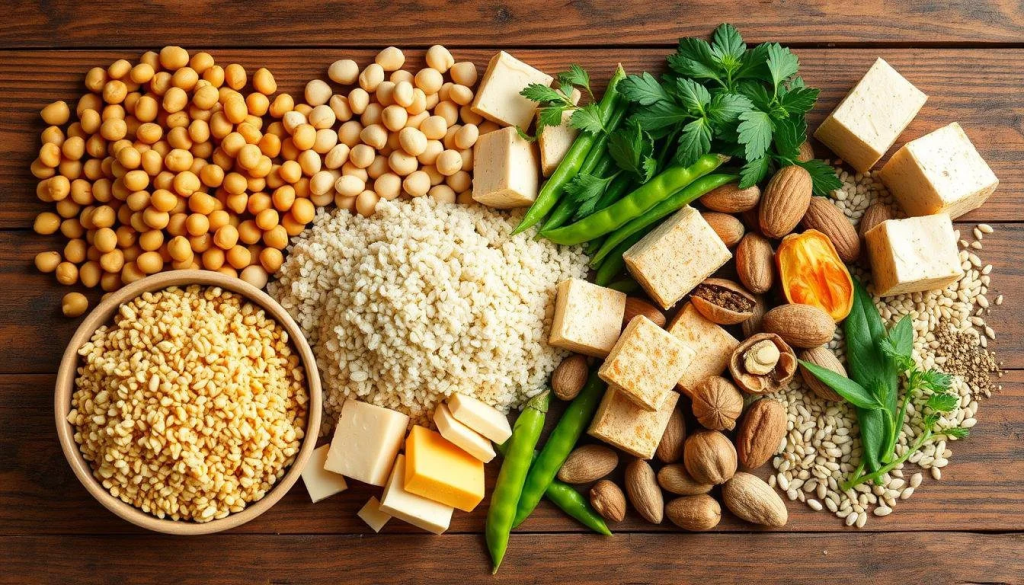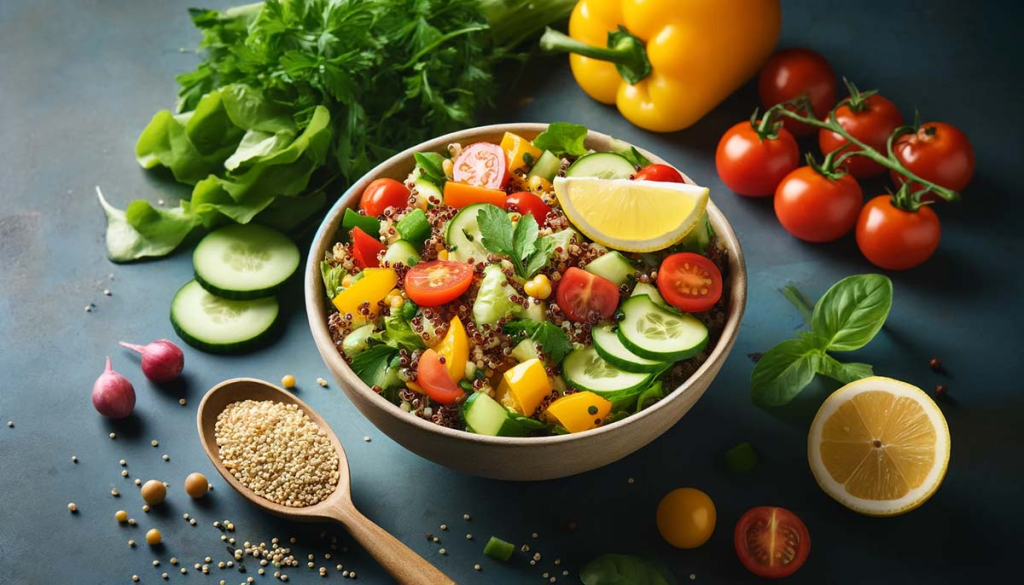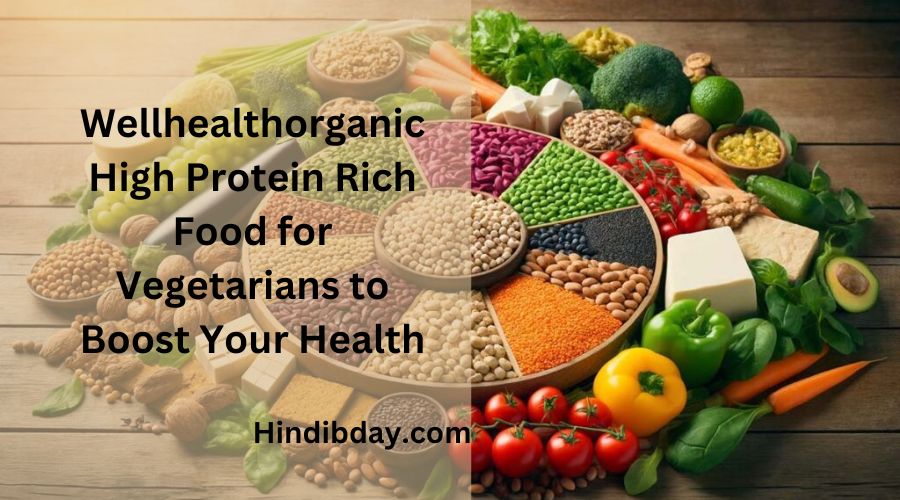A balanced diet is essential for maintaining a healthy lifestyle. For vegetarians, ensuring adequate protein intake can sometimes be a challenge, but with the right choices, it is entirely possible to meet your protein requirements. Wellhealthorganic high protein rich food for vegetarians to boost your health focuses on plant-based protein sources that are both nutritious and delicious. In this article, we’ll explore these options and provide practical tips on incorporating them into your diet.
Why is Protein Important for Health?
Protein is a macronutrient that plays a vital role in the body. It is essential for building and repairing tissues, producing enzymes and hormones, and supporting the immune system. Whether you’re an athlete, a fitness enthusiast, or someone leading a busy life, protein is crucial for energy and overall well-being.
For vegetarians, traditional protein sources like meat and fish are off the table. However, there are plenty of plant-based options that can provide the same benefits without compromising on nutrition.

Top High-Protein Rich Foods for Vegetarians
Here is a detailed list of the best plant-based protein-rich foods that can boost your health:
1. Lentils
Lentils are a powerhouse of protein and nutrients. One cooked cup provides around 18 grams of protein. They are also rich in fiber, which promotes good digestion and helps regulate blood sugar levels.
- How to Include: Add lentils to soups, curries, or salads. Red lentils are great for making a creamy dal, while green lentils work well in hearty salads.
2. Chickpeas
Chickpeas, or garbanzo beans, are versatile and delicious. They contain about 15 grams of protein per cooked cup. Besides protein, they are an excellent source of vitamins, minerals, and fiber.
- How to Include: Make hummus for a creamy dip, toss chickpeas into salads, or roast them for a crunchy snack.
3. Quinoa
Quinoa is a gluten-free, complete protein, meaning it contains all nine essential amino acids. A cooked cup of quinoa provides around 8 grams of protein.
- How to Include: Use quinoa as a base for grain bowls, mix it into salads, or cook it as a breakfast porridge with fruits and nuts.
4. Tofu and Tempeh
Made from soybeans, tofu and tempeh are excellent sources of protein. Half a cup of tofu contains about 10 grams of protein, while tempeh provides 15 grams in the same amount.
- How to Include: Stir-fry tofu or tempeh with vegetables, marinate and grill them, or use them as a meat substitute in sandwiches and wraps.
5. Edamame
Edamame, or young soybeans, are another high-protein food. One cooked cup contains approximately 17 grams of protein.
- How to Include: Enjoy edamame as a snack, sprinkle it over salads, or toss it into stir-fries for added nutrition.
6. Greek Yogurt
For lacto-vegetarians, Greek yogurt is an excellent protein source, with around 10 grams per 100 grams. It is also rich in calcium and probiotics, which support bone health and digestion.
- How to Include: Have Greek yogurt as a snack, blend it into smoothies, or use it as a base for creamy salad dressings.
7. Nuts and Seeds
Nuts like almonds and peanuts, and seeds such as chia, hemp, and pumpkin seeds, are packed with protein. Two tablespoons of chia seeds contain about 4 grams of protein, while an ounce of almonds provides 6 grams.
- How to Include: Sprinkle nuts and seeds over oatmeal, mix them into smoothies, or carry them as a convenient snack.
8. Beans
Beans like black beans, kidney beans, and pinto beans are rich in protein, with around 15 grams per cooked cup.
- How to Include: Use beans in stews, burritos, or veggie burgers for a hearty, protein-packed meal.
9. Spinach
While spinach is not as high in protein as legumes, it still offers a significant amount, around 5 grams per cooked cup. It is also rich in iron, which is vital for vegetarians.
- How to Include: Add spinach to smoothies, pasta dishes, or as a side sautéed with garlic.
10. Seitan
Seitan, also known as wheat meat, is a protein-rich food made from gluten. A 3-ounce serving contains about 21 grams of protein.
- How to Include: Use seitan as a meat substitute in stir-fries, sandwiches, or grilled dishes.

How to Incorporate High-Protein Foods Into Your Diet
Incorporating these foods into your daily meals is easy with a little planning. Here are some ideas:
Breakfast
- Start your day with a protein-packed smoothie using Greek yogurt, chia seeds, and spinach.
- Enjoy a quinoa porridge topped with nuts and fruits.
Lunch
- Prepare a hearty lentil soup or a chickpea and spinach curry with brown rice.
- Make a salad with quinoa, edamame, and roasted vegetables.
Dinner
- Opt for tofu or tempeh stir-fried with vegetables, served with whole grains.
- Create a black bean burger or a seitan stir-fry.
Snacks
- Snack on roasted chickpeas, edamame, or a handful of almonds.
- Spread hummus on whole-grain crackers or use it as a dip for veggie sticks.
Benefits of High-Protein Vegetarian Foods
Eating high-protein foods offers several health benefits, including:
- Muscle Maintenance: Protein supports muscle repair and growth, making it essential for active individuals.
- Satiety: Protein keeps you fuller for longer, reducing hunger pangs and aiding in weight management.
- Energy Boost: A protein-rich diet helps sustain energy levels throughout the day.
- Better Digestion: Many plant-based proteins are high in fiber, promoting gut health.
- Heart Health: Plant-based proteins are generally low in saturated fat, contributing to a healthier heart.
Why Choose Wellhealthorganic High Protein Rich Food for Vegetarians?
Wellhealthorganic provides a curated list of high-protein foods that cater specifically to vegetarians. Their focus on natural, organic options ensures that you receive maximum nutrition without any harmful additives. By choosing these foods, you support sustainable eating practices while boosting your health.
The Importance of Protein in a Vegetarian Diet
Protein is essential for vegetarians to maintain optimal health. It plays a vital role in building muscle, repairing tissues, and producing enzymes and hormones. For vegetarians, plant-based protein sources like lentils, beans, and tofu are key to meeting daily protein requirements without compromising on nutrition. These foods are not only rich in protein but also offer other essential nutrients like fiber, iron, and vitamins.

Common Myths About Vegetarian Protein Sources
There’s a common misconception that vegetarians cannot get enough protein. However, plant-based foods can easily fulfill protein requirements when consumed in the right combinations. Foods like quinoa, soy, and seitan are complete proteins, containing all nine essential amino acids. Pairing foods like rice with beans or hummus with whole-grain bread can also create a complete protein profile, debunking the myth that vegetarian diets are protein-deficient.
Read To Know ABout: Wellhealthorganic Surgery for Wrist and Ankle Injurie
Benefits of Organic High-Protein Foods for Vegetarians
Opting for organic protein sources ensures that the food you consume is free from harmful pesticides and additives. Wellhealthorganic high protein rich food for vegetarians to boost your health offers a variety of nutritious, organic options like edamame, tofu, and nuts. These foods are not only more nutrient-dense and flavorful but also support sustainable farming practices, contributing to environmental preservation and providing “peace of mind” about your food quality.
Comparison of Popular Vegetarian Protein Sources
| Protein Source | Protein Content per Serving | Other Benefits | How to Use |
|---|---|---|---|
| Lentils | 18g per cooked cup | High in fiber, aids digestion | Use in soups, curries, and salads. |
| Chickpeas | 15g per cooked cup | Rich in vitamins and minerals | Make hummus, curries, or roast them. |
| Quinoa | 8g per cooked cup | Gluten-free, contains all amino acids | Use in bowls, salads, or as porridge. |
| Tofu | 10g per half cup | Versatile, low in fat | Stir-fry, grill, or add to soups. |
| Edamame | 17g per cooked cup | High in fiber and antioxidants | Snack on them or add to salads. |
This table highlights the protein content and additional benefits of popular vegetarian options, helping you make informed dietary choices.
Read To Know About: Wellhealthorganic Laser Technology Benefits for Health and Wellness
How to Plan a High-Protein Vegetarian Diet
Planning your meals around high-protein foods ensures that you meet your nutritional needs while enjoying diverse flavors. Start with protein-rich breakfasts like quinoa porridge or Greek yogurt smoothies. For lunch, incorporate lentils or chickpeas into soups and salads. Dinner can include tofu or tempeh stir-fries, paired with vegetables and grains. Snacks like roasted nuts, edamame, or hummus with veggie sticks are perfect for keeping you full throughout the day.

Conclusion
A vegetarian diet can be rich in protein when you include the right foods. Options like lentils, quinoa, tofu, and nuts provide all the necessary nutrients to keep you healthy and energetic. Wellhealthorganic high protein rich food for vegetarians to boost your health offers an excellent guide to making nutritious choices that benefit both your body and the planet. Start incorporating these protein-packed foods into your meals today and enjoy the numerous health benefits they offer!
Read More: Wellhealthorganic Home Remedies Tag: Natural Solutions
Frequently Asked Questions (FAQs)
What is Wellhealthorganic high protein rich food for vegetarians?
It’s a collection of plant-based, organic protein-rich foods designed to meet the dietary needs of vegetarians while promoting overall health.
Why is protein important in a vegetarian diet?
Protein is essential for muscle repair, energy, and overall body function. Vegetarians can meet their protein needs with foods like lentils, tofu, and quinoa.
Which high-protein foods are recommended for vegetarians?
Foods like lentils, chickpeas, quinoa, edamame, tofu, and nuts are excellent high-protein options for vegetarians.
Are organic protein sources better than regular ones?
Yes, organic protein sources are free from harmful pesticides, more nutrient-dense, and support sustainable farming practices.
How much protein does a vegetarian need daily?
The average adult needs about 46-56 grams of protein daily, which can be achieved through a well-planned vegetarian diet.
Can vegetarians get complete proteins from plant-based foods?
Yes, foods like quinoa, soy, and seitan are complete proteins. Combining foods like beans and rice also provides all essential amino acids.
How does Wellhealthorganic promote sustainable eating?
By offering organic and plant-based options, Wellhealthorganic supports eco-friendly farming and encourages sustainable dietary practices.
What are the benefits of high-protein foods for vegetarians?
High-protein foods improve muscle health, increase satiety, stabilize blood sugar levels, and provide long-lasting energy.
How can I incorporate high-protein foods into my daily diet?
Include foods like Greek yogurt in breakfast, lentils in lunch, tofu in dinner, and nuts or edamame as snacks.
Why choose Wellhealthorganic for high-protein vegetarian foods?
Wellhealthorganic ensures high-quality, organic, and nutrient-rich food options that are both healthy and environmentally friendly.

